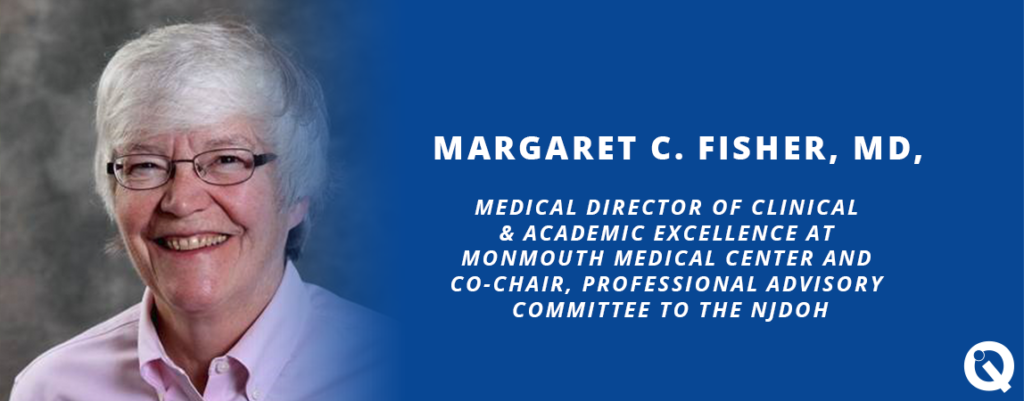Margaret C. Fisher, MD, specializes in infectious disease and pediatrics. She is co-chair of the Professional Advisory Committee to the New Jersey Department of Health. Dr. Fisher is also Medical Director of Clinical and Academic Excellence at Monmouth Medical Center.
As a key advisor to the Department of Health, you are helping to lead the COVID-19 vaccination effort in New Jersey. What are your experiences so far?
I’m a pediatric infectious disease doctor, so this effort in public health is an incredible leap to help lots of people. Right now, the vaccine can be administered to children down to the age of 12, and we’re hoping we can get that down to ages five and maybe down to infants by the end of the year. I’ve been involved with getting the vaccines to the most vulnerable populations and the most high-risk groups including the elderly — especially those who are homebound — those with disabilities, the homeless, and migrant workers. But we want to make sure the vaccine gets to everyone as they become eligible. We have administered more than 11.2 million doses of vaccine so far, and 70 percent of those eligible right now in New Jersey are fully vaccinated.
The Department of Health created a program of Community Ambassadors to work closely with the department to engage people who are not vaccinated. How is the program going?
Creating the Community Ambassador Program was a brilliant move on the part of the commissioner (Judith Persichilli.) We have 11 counties that had towns and municipalities who were well under 70 percent vaccination rates. The commissioner assigned a trusted Department staff member to each of those counties to talk to people, talk to the mayors … community and faith-based groups and others to understand how to get more people vaccinated. We’ve gotten to 80 percent of our target. Only eight weeks after we started, we have two counties with all their municipalities at 70 percent. We found that most of the barriers surrounded access or convenience. Some people wanted to wait to see how their neighbors or others did with the vaccine. Others found it difficult to find the time because they are juggling two jobs and families. So, we created pop-up sites in neighborhoods with walk-in hours. We were able to reach the socially vulnerable.
The concept of community ambassadors reminds us of old-school public health efforts. Do you envision programs like this being used in other ways?
Absolutely. And, yes, these boots-on-the-ground efforts are good, old-fashioned public health. We are using two groups of trained canvassers and volunteers to help us. We have the COVID Community Corps and the Civic Operations Group. They go out and knock on doors and talk to people and try to counter the misinformation that’s out there. The civics group also provides information about where to get food, housing services — perhaps information on services for people who are disabled. It’s a nice way to ensure that we’re getting wrap-around-services to people who needed them most as we reach people about the vaccine.
As a pediatrician, what advice do you have for parents concerned about giving consent for their children over the age of 12 to receive the COVID-19 vaccine? And what advice will you give as the approved age for vaccination declines?
What I say to parents of adolescents is that we want to protect your children. And the best way we can protect them from COVID-19 is by getting them vaccinated. We also want to ensure that this year they get to go to school and stay in school and have the social interaction that they missed out on last year. We’re using a layered approach — and one of the layers is vaccination. Currently, 57 percent of 12 to 17-year-olds have gotten at least one dose, but we must do better. Another layer is wearing masks. And another layer is keeping physical distance of three to six feet. We don’t want children to get the virus at all. We know that most of the time they don’t get severely ill. But sometimes they do. And we also know that as people continue to become infected the virus can mutate and form new variants.
Finally, we like to ask people about their lives outside of work. Where might we see you when you have some downtime?
I have a wonderful nephew who lives in my house. He’s 18, and one of my favorite things is to go play basketball with him.

